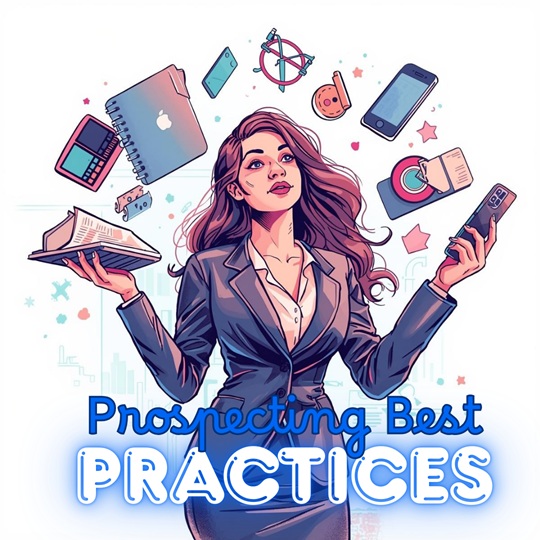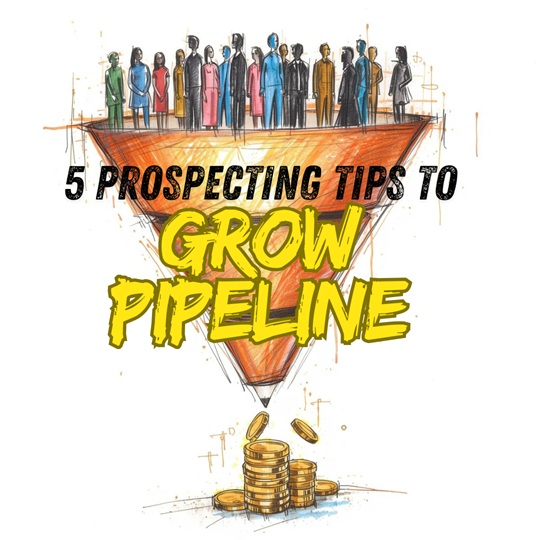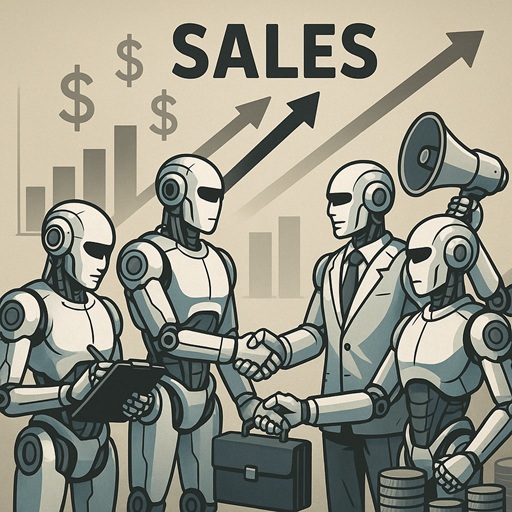One of the most famous movie lines from the ‘Wolf of Wall Street’ about doing sales is when he tells a group of sales reps to “sell me this pen.”
The goal is to be able to sell anything at any time to anyone, which in theory sounds great, but it might not always be the most productive or efficient, especially for Software as a Service (SaaS) sales.
If your motto for doing SaaS sales is "growth at all costs," then you're doing it wrong.
The idea that you can jump into SaaS sales with a "spray and pray" approach without a strategic plan of attack is inefficient and costly.
Instead, let's reframe this outdated SaaS sales approach into something that's more useful and relevant for today's evolving world of B2B SaaS sales: Adapting to your strong suit as a player in the game.
Not everyone has the best cold calling strategies. Some SaaS sales professionals are also better at prospecting than others.
It's important to know where your forte is in your skillset and to lean into what's working instead of pursuing everything all at once.
Before we dive into the secrets of growing your SaaS sales success, let's cover some basics.
You'll learn everything you need to know about SaaS sales, including:
- What is SaaS sales?
- The stages of the SaaS sales cycle and the SaaS sales process
- Why is SaaS sales unique?
- Tips on how to succeed in B2B SaaS
- Career paths in SaaS sales
- Key metrics you should know for tech sales
Let's dive right in.
What is SaaS sales?
First, let’s define what SaaS is all about. It’s simply an acronym for the term "software-as-a-service", or software that serves other companies.
SaaS sales is the sales process of selling software or tech tools to customers/clients.
In the B2B realm, SaaS sales is the most common type of business-to-business sales approach. The term is usually used interchangeably with "B2B sales" because of how prominent software and tech sales are in the B2B business space.
According to a report from Statista Market Insights, revenue in the SaaS market reached $258.6 billion in 2023 and is projected to increase to $282.2 billion in 2024. Business is booming in this industry, making it an attractive career path for many in the past couple of years.
Also, SaaS sales is not something that AI is going to be able to replace or take over any time soon, as much as some companies or sales executives might hope.
The real question is: What do you want to do in SaaS sales?
To answer this question, it's important to understand what's involved in the tech sales cycle, SaaS sales models, and the different roles in the industry.
📘 Related: What is B2B sales?
The B2B SaaS sales cycle, step-by-step
The B2B SaaS sales cycle looks something like this:

The process of tech sales pretty much depicts what you would expect from your typical SaaS sales pipeline: find new prospects, reach out to them, convert them into customers, and keep them coming back.
Here’s what you can expect at each stage of the SaaS sales cycle:
- Prospecting: Finding new potential customers who fit your ideal customer profile (ICP) who seem likely to buy your product or service.
- Contacting/reaching out: This is the stage where tech sales professionals send out cold emails, cold calls, direct phone calls, or social media.
- Lead qualification: Not all leads are equally likely to become customers–some are more likely than others. Qualifying leads is all about evaluating which leads are most likely to become customers and prioritizing the highest quality leads.
- Nurturing: Once you’ve qualified your leads, it’s time to nudge them towards becoming a buying customer. Nurturing is all about building connections and rapport with potential customers through cross-channel communication and content marketing, like blog posts or social media.
- Proposal: When the prospect is ready to buy and commit, it’s time to propose an offer to the customer. A best practice for SaaS sales proposals is to send a few different options or offers to avoid too much back and forth.
- Negotiation: Once you’ve sent the proposal to the customer, there may be some back and forth for negotiating pricing, features, or other aspects of the offer. Be prepared to be flexible during this stage of the SaaS sales cycle.
- Closing: Closing the deal after going through all the previous steps of the sales process can be daunting, but this stage is all about reaffirming the value that you’re delivering to the customer.
- Renewals: Once a customer is a paying customer, whether monthly or yearly, the renewal stage is arguably one of the most difficult steps of the sales cycle. Customer success renewals are all about getting customers to come back to you time and time again.
To generate a strong sales pipeline, each step of the SaaS sales cycle must be done strategically–especially prospecting. Never skimp on prospecting.
While sales prospecting can be time-consuming and difficult, there are ways you can do it smarter. Consider using a real-time B2B sales prospecting tool like Seamless.AI to automate your list-building and lead generation efforts.
📘 Related: How to 10x Your Customer Success Renewals with This 7-Step Framework
Difference in SaaS selling vs traditional sales
The key differences between sales in the SaaS industry vs other B2C sales are that SaaS sales has:
- Much longer sales cycles
- Higher price points
- More ongoing communication
- More technical product knowledge
- Monthly recurring subscription models
The main reason for these differences is that most SaaS companies are not only looking to serve customers at the individual level, they're looking to help other companies crush their overall business goals as well.
In the tech world, your success in SaaS sales hinges on the success of other companies using your SaaS products.
Let's dive into a few reasons why doing sales in SaaS is unique and how it differs from doing "regular" sales.
📘 Related: AI Sales Tools Transforming the SaaS Industry
The biggest challenges in SaaS sales (and how to overcome them)
Selling SaaS comes with challenges that traditional sales teams rarely face:
- Market saturation: With so many SaaS companies and SaaS products available, it’s tough to stand out in a crowded industry.
- Long sales cycles: Deals often take months to close, requiring persistence, a strong sales process, and alignment across the team.
- Complex products: Many customers need education before they fully understand the value and benefits of the software.
- Multiple decision-makers: Enterprise deals often involve entire buying committees, which makes the sales cycle longer and more complex.
- Data-driven buyers: Every prospect expects proof—case studies, metrics, and clear solutions that demonstrate ROI.
The best SaaS sales reps don’t ignore these hurdles—they anticipate them, refine their sales strategy, and build repeatable processes to overcome them. That’s what sets high performers apart and drives long-term success.
What makes SaaS sales unique?
What folks can expect from B2B SaaS is constantly evolving.
While there are a few key characteristics about SaaS sales that makes it different from sales in other industries, the SaaS industry is constantly coming up with new concepts and models to change the status quo.
Here are some of the more "common" characteristics in the process you'll find in the tech sales industry compared to other sales:
- Monthly recurring revenue (MRR) models
- Churn rate tracking
- Emphasis on customer onboarding
- Longer sales cycles
- Customer lifetime value (CLV)
- Enterprise sales for large organizations
Nowadays, some SaaS companies are moving away from pigeonholing themselves to either a strictly product-led growth business model or a strict sales-led growth model to a more flexible business model, like scaled customer experience.
In other words, rather than banking on only one or the other business models, companies in the SaaS sales world are trying a more hybrid model of focusing on customer experience and education as the primary growth driver of a tech company's success.
📘 Want to learn more? We talk more about how a scaled CX model helps drive growth for a business's go-to-market strategy here.
How to break into SaaS sales (even if you’re new to tech)
If you’re just starting out in SaaS sales, the best approach is to focus on the fundamentals that drive long-term success:
- Choose the right sales model: Decide whether inbound, outbound, or a product-led sales model works best for your SaaS company.
- Define your target audience: Know your ideal customer and the pain points your software helps solve.
- Refine your value proposition: Clearly communicate the value of your SaaS product and why it’s the best solution.
Qualify prospects quickly: Focus on the leads most likely to convert to reduce wasted time and increase revenue potential. - Build a repeatable strategy: Create a sales process that your sales team can use consistently as the business grows.
- Set measurable goals: Track key metrics to understand performance, improve your strategy, and drive growth.
Even if you’re brand new, focusing on these basics provides a strong foundation to build on and positions you for long-term success in the SaaS industry.
How to be successful in SaaS sales (tips from real tech sales experts)
Before you dive head-first into selling SaaS, most people want to know: Is selling SaaS difficult?
The short answer is both yes and no.
In reality, it all depends on two things: your expertise and your sales skills. The good news is, those are two things that can be learned or developed.
Here's a great piece of advice from the CEO of IBM: You can have it all, just not at the same time.
If you're ready to learn what it takes to become a successful SaaS seller, here are a few key tips you absolutely should know:

1. SaaS sales is more about developing relationships than closing deals.
While your main goal is to reach your weekly or monthly quotas for booked meetings, closed deals, and other SaaS sales KPIs, don't fall victim to "main character syndrome".
Rather than having the mindset "me, me, me", reframe your sense of self in terms of how you can serve your customers or be a key partner for their success.
Instead of being the main character all the time, consider putting the needs of your customers first. This simple reframing of your mindset will help you foster much longer and better quality client relationships as you grow in your SaaS sales career.
"Long-term client connections generate repeat business and referrals. I always emphasize the value of follow-up and individual client involvement to my team."
- Jen Seran, Director of Operations at Stallion Express
SaaS sales clients want to feel like they are seen, heard, and most of all–valued.
In reality, it's much easier to maintain established relationships over time rather than to continuously make new connections.
Don't underestimate the power of rapport and relationship-building in the world of SaaS sales.
2. Focus on bottlenecks, not just upselling.
According to Anu Varila, Customer Success Director at TrustMary, you should spend time building trust and connections with your customers so that they feel comfortable enough to tell you their problems.
Once you understand what the root of their problems are, you can focus on how to relieve those bottlenecks for them rather than cross-selling or upselling off the rip.
Rather than just reciting a list of features to prospects, it's also important to know how each feature can help solve each customer's unique pain points.
Here's what worked for Debby Moran, a marketing manager at RecurPost:
"What worked for me is mastering the product knowledge and understanding the product inside and out. This isn’t just about knowing the features but also understanding how it solves your customers’ problems."
While it's important to have technical product knowledge in SaaS sales, the key differentiator between good SaaS sales pros and great sales pros are the ones who know how to apply technical features to a specific customer problem as a unique solution.
It's all about knowing both the product and your customers.
3. Always ask questions and never assume.
If you're in SaaS sales, most people might assume you're usually the loudest, most talkative person in the room.
To succeed in SaaS sales, it's actually the opposite. You need to be more of an active listener who's able to observe, engage, and follow-up.
"Being inquisitive is the most important skill needed in tech sales. Asking yourself as many "5 Whys" will allow you to drill down into your metrics and customer behavior to create better strategies."
- Gloria Joseph, Growth Manager at Mailmodo
This goes back to being more humble about your intentions of connecting with others. Having direct conversations with your customers or prospects isn't the time for you to boast about how great your product is. It's valuable time that you can use to dig deeper into the nuances of your customers' needs, wants, challenges and more.
Always ask and probe more about your customer's responses–in a thoughtful and intentional way. Ask questions that ask for more detail, expand more on the customer's comments, or provide more context.
4. Be biased towards information-based communication.
At the end of the day, anyone can sell anything if they say and do the right things, regardless of whether they're a brand new SaaS sales professional or an expert with over 10 years of experience.
In order to say and do the right things in SaaS sales, you need to be informed.
What's more, you need the skills to articulate the value of your offering to your prospects efficiently and clearly. You can be the most charming and interesting salesperson, but you also need to brush up on your technical expertise to communicate complex ideas, values, and concepts in a simple manner to new customers.
Don't simply claim to new prospects that your product is the best. Show them, don't tell them.
Some examples of information-based communication include:
- Case studies and success stories from your current customers
- Data reports to substantiate your claims
- Customer testimonials and reviews
You can sell your product as hard as you want, but make sure you have the receipts and evidence to back up those sweet promises.
5. Make connections.
When you're first starting out in SaaS sales, connections are your golden ticket to making the most out of your career.
Even when you're not booking meetings directly with prospects or sending cold emails or cold calls, you should still be making connections in your spare time.
There are a few key reasons why you want to focus on making connections:
- Connections lead to customer referrals, which become leads that are much easier to capture in the sales pipeline
- Connections lead to opportunities for mentorship or mentee-ship
- Connections are the gateway to future partnerships or collaboration
Making connections isn't just about greeting everyone, being extroverted, or striking up a conversation with everyone in sight. You need to focus on making meaningful and intentional connections that will be mutually beneficial.
A great way to find new connections with people who will care about what you have to offer is industry events, whether online or in-person.
"Attending industry events and conferences provided me with direct access to the latest innovations and best practices in SaaS sales. These gatherings were excellent for meeting potential clients, partners, and mentors. Workshops and sessions at these events enhanced my skill set and provided insights from industry leaders."
- Laia Quintana, Director of Product and Event Marketing at Daysmart & TeamUp
6. Learn how to navigate sales objections.
Sales objections are like the white whale of the tech sales world. Here's a hard pill to swallow: You don't always have to "handle" sales objections.
Not handling sales objections doesn't mean to simply ignore them. Instead of viewing sales objections as something to "handle" or argue with a customer about, think of sales objections as opportunities to reframe your outreach.
Reframing your outreach may look like deciding not to pursue a specific prospect right at this time and keeping them in mind for later, or it could look like switching gears and selling a different product to a prospect than what you originally had planned.
Sales objections aren't the end of the world, they're just opportunities for you to flex your problem-solving skills and ability to pivot your strategy quickly.
📘 Still feeling unsure of how to deal with sales objections? We talk more about this topic in 22 Common Sales Objections, including sample responses to help you when you're feeling stuck.
SaaS sales roles
Jobs in tech sales, especially B2B SaaS, are highly coveted and normalized in today's world of remote and hybrid work.
It's the perfect type of job for people who want to dabble in both sales and tech.
However, the reality of SaaS sales is that the lows are low, and the highs are high.
Not everyone is cut out for the B2B industry, especially in tech sales. But if you're still intrigued with the idea of breaking into tech sales, here are a few job titles in SaaS sales you can explore:
- Sales development representative (SDR)
- Customer success manager (CSM)
- Account executive
- Business development representative (BDR)
- Sales manager
- Account coordinator
We'll explain a bit about the top three roles in SaaS sales below: SDR, CSM, and BDR.
📘 Related: How to Land a Tech Sales Job
SaaS sales rep (AKA the SDR)
Most people start their career in SaaS sales as a sales development representative.
This role helps you cultivate the building blocks you need to learn what it takes to navigate the sales pipeline in any organization.
As an SDR, you'll likely be in charge of:
- Outreach
- Prospecting
- Lead qualification
In short, you should focus on building connections with as many leads as possible and evaluating whether they're a good fit for your ideal customer profile (ICP).
The only caveat here is that SDRs usually deal with inbound sales leads, or leads that find and contact you first. Outbound leads are usually handled by BDRs, but we'll get more into that below.
📘 Related: What is an SDR
Business development representative (AKA the BDR)
In the SaaS industry, sometimes BDR and SDR are used interchangeably.
However, these two roles have slightly different responsibilities. While both roles focus on handling leads at the start of customers joining the sales pipeline, BDRs focus more on prospecting outbound leads (sales leads that you find and contact first).
As a BDR, you'll be in charge of:
- Cold emailing
- Cold calling
- Networking
- Social selling
BDRs basically generate qualified leads for an organization. The thought of doing cold emails or cold calling can be daunting, but it's a viable career path for those who are skilled at making a great first impression and making connections from the jump.
📘 Related: 17 B2B Cold Email Outreach Templates
Customer success manager (AKA the CSM)
Being a CSM differs from being an SDR because you're mostly focused on providing customers with the tools and support they need to achieve their goals.
You won't be in charge of finding new prospects but rather helping new customers as they onboard and use your company's product in their daily work.
As a CSM, you'll likely be in charge of:
- Customer onboarding
- Training
- Relationship building
- Troubleshooting any issues
There's an ongoing debate in the SaaS world about whether or not CSMs are in charge of securing customer renewals.
Whether you're for or against the idea of completely owning this as a CSM, it's clear that CSMs can have an impact on helping customers reach the renewal stage of the sales pipeline.
CSMs are a strong point of contact for customers to make sure customers are achieving their desired outcomes while using a product or service. When it comes time to decide whether a customer will renew their subscription or plan with your company, CSMs support and ongoing communication can either make or break the customers' decision.
📘 Want to learn how to get customers to renew with you time and time again? Read about this simple, 7-step framework called S.P.L.A.I.T.E. to help customer success teams retain more customers, crush customer success metrics, and keep customers happy.
SaaS sales metrics you need to know
So far, we’ve covered all the bigger themes you need to focus on to succeed in SaaS sales, like building connections, focusing on the customer, and what different career paths in tech sales look like, but let’s be honest folks get into sales to make money.
As Jordan said in ‘Wolf of Wall Street’, “I want you to deal with your problems by becoming rich”.
What about the KPIs?
Working in tech sales is all about your people skills, but business goals and metrics are key to helping you track your progress in terms of your wider organizational goals.
Rather than thinking about sales metrics as ticking time bombs that will make or break your company’s success (although sometimes it feels like they are), use sales metrics as reference points that help nudge you to your team’s goals.
Here are a few SaaS sales metrics you should know:
- Customer churn rate: The percentage of customers who stop doing business with you. This takes into account how many customers you started with at the start of a time period and how many you lost during that time period.
- Revenue churn rate (AKA MRR churn): The percentage of monthly recurring revenue (MRR) your company lost from downgrades and cancellations in a given period of time.
- Customer lifetime value (CLV): How valuable a customer is overall. This takes into account the average revenue per user, gross margins, and the churn rate.
- Customer acquisition cost (CAC): How much money your company spends to get a prospect to become your customer and buy from you. This accounts for sales and marketing spend.
- Customer health score: A measurement of how “at-risk” customers are of churning. This metric is usually owned by customer success teams.
The list of metrics you should know for tech sales can go on forever, but these key metrics are the foundational ones that help paint the big picture of how well your sales efforts are going for the company’s overall success.
SaaS sales best practices every sales rep should know
The most successful SaaS sales reps follow a few proven best practices that apply across SaaS companies and sales teams:
- Master the product: Know your SaaS product inside and out—the features, benefits, use cases, and the value it delivers to the customer.
- Listen actively: Understand each prospect's needs and challenges instead of just selling. This builds stronger relationships and reduces potential churn later.
- Adapt to feedback: In a fast-moving industry, flexibility is key. Adjust your sales process when buyer insights point you in a better direction.
- Leverage the right tools: Use CRMs for lead generation and activity tracking, automation platforms for outreach, and knowledge bases to respond quickly to tough questions. These tools help improve efficiency and increase revenue.
Build trust and confidence: A repeatable sales strategy not only makes the process more effective but also helps your team handle objections, provide solutions, and close deals faster.
What it's like to work in SaaS sales, in a nutshell
"While technical abilities and product expertise are essential, soft skills such as communication, relationship-building, and adaptability are just as crucial. To succeed in SaaS sales, remain curious, continue to learn, and cultivate your professional ties."
- Jen Seran, Director of Operations at Stallion Express

Of course, the reality of this career path is that there will always be things outside of your control that affect your outcomes. There will always be organizational red tape, product development issues, and difficult sales objections to overcome.
The key to succeeding in SaaS sales is to focus on cultivating your ability to solve problems and delivering value at every point of the customers' journey, whether it be introducing a prospect to a product that could change their work life, or simply making meaningful connections with others in the industry.
Remember this: At the end of the day, when talent beats hard work, hard work beats talent. And if you're not at a place where your hard work or talent is getting you to the pinnacle of success that you imagined, take some time to identify actionable steps to get where you want to be.
📘 Related: 50+ Motivational Sales Quotes
Still don't know whether SaaS sales is the right career move for you?
Here's a golden nugget SaaS sales tip from a poster on Reddit about how she decided that a tech sales role was the right fit for her:

In the long run, knowing your own strengths, weaknesses, and the work-life you envision for yourself is key to deciding whether or not SaaS sales is a great fit for you–regardless of whether you're a newbie just getting started or a seasoned tech sales pro evaluating your next career moves.
.png)
















